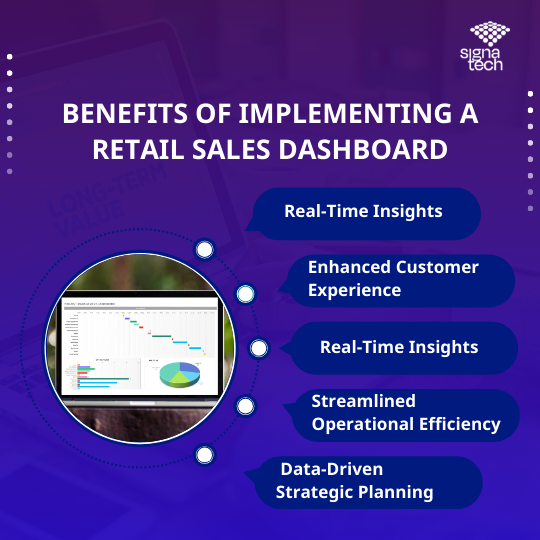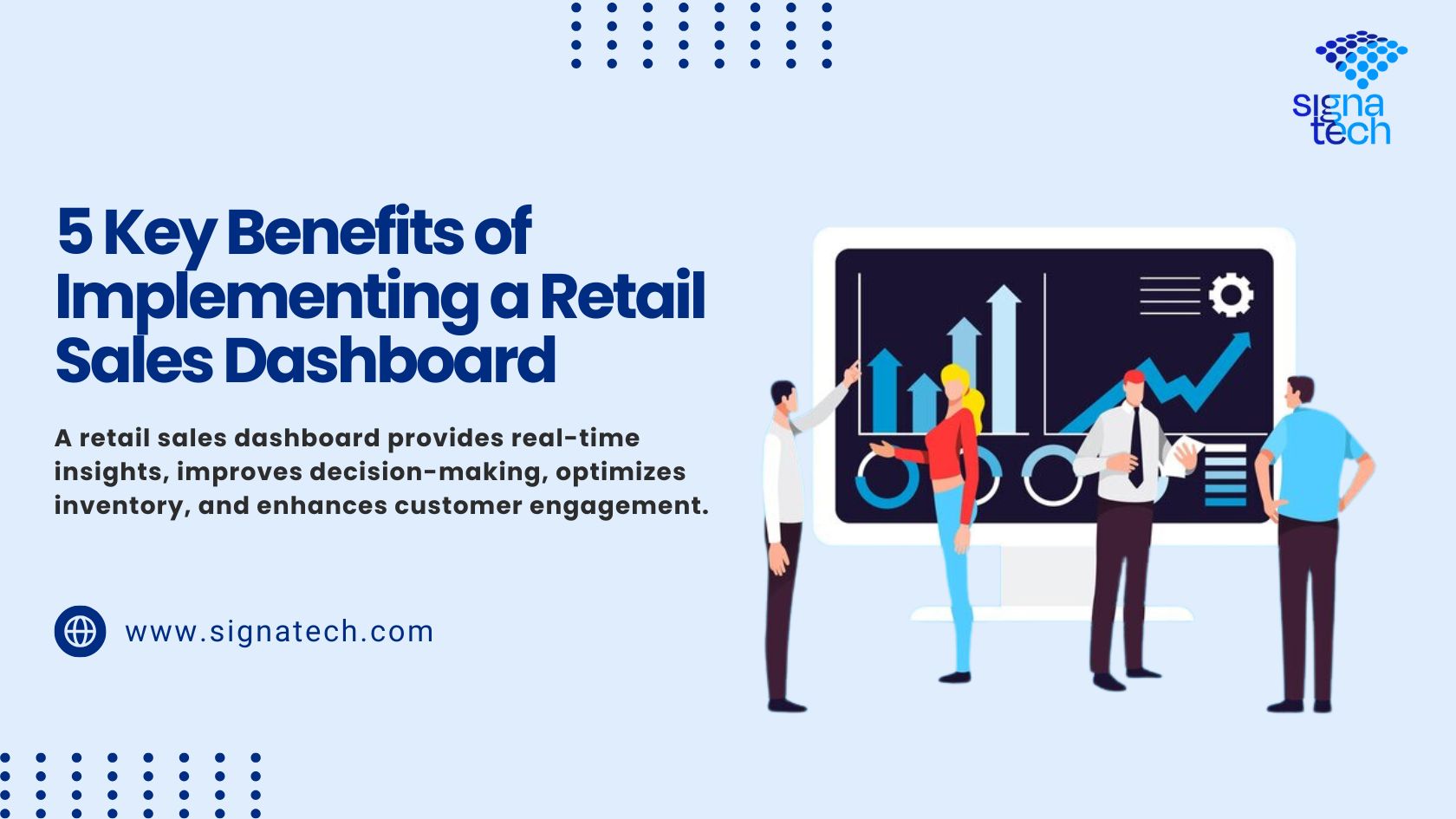Due to intense competition in the retail sector, a businessperson cannot afford to rely on hunches anymore. Retailers require information that can be put into use for the purpose of achieving the goal. This is where a retail sales dashboard becomes invaluable. A sales dashboard consolidates essential business indicators into one tool, allowing retailers to optimize work, satisfy customers, and make decisions that will lead to further development.
In this article, I will highlight five advantages of using this tool and how it can change your retail company.
Benefits of Implementing a Retail Sales Dashboard

1. Real-Time Insights
Now, there is no need to wait for end-of-day or weekly sales reports. This tool is an effective solution as it gives an instant view of the most important sales figures, which means it can be used to view the business performance as it unfolds. With instant access to metrics like sales figures, customer behaviors, and inventory levels, you can:
- Quickly adapt to market trends: In case you have a product that has started to trend, you can quickly invest in the product to tap into the new market.
- Identify performance gaps: Identify low performing stores, products, or sales teams, and immediately take necessary action to rectify the situation.
- Make faster, smarter decisions: Real-time data reduces the likelihood of making assumptions and therefore, all the decisions made are informed.
For instance, consider the idea of running a weekend sale for a particular product group. A dashboard can tell you almost immediately whether or not the promotion is capturing the attention of customers. If sales are below target, you can try to adjust your campaign approach or provide special offers to your audience.
The ability to get real time information has become a necessity which any retail firm that intends to be on the cutting edge needs to have.
2. Improved Inventory Management
Every retail business relies on inventory management, and a retail sales dashboard makes it easier to manage inventory. Inventory management entails the right stocking of products to meet the customers’ demands without having to order for more than what is required. A dashboard helps you:
- Track inventory turnover rates: Know which products are popular and which are not in order to restock those with high demand.
- Reduce holding costs: Do not acquire large stocks that consume capital and storage space and for which there is little demand.
- Prevent stockouts: To avoid having the shelves empty, use real time to determine which products are almost out of stock and order for them to be restocked.
For example, a dashboard might show that a certain product is popular in a certain area. With this insight, you can run out of stock or order in advance so that customers do not walk away without what they need.
Also, cyclical factors are less problematic when it comes to using a dashboard. If winter clothing is going out the door faster than expected, a dashboard can lead you to restock before it runs out. Better stock control does not only increase sales but also customer satisfaction because the product is always in stock.
3. Enhanced Customer Experience
In retailing, customer satisfaction is the most important thing that keeps the business going. A dashboard of retail sales can greatly improve the customer experience as it would offer a deeper understanding of the customer’s shopping habits. By knowing what your customers want, they can be happier when receiving products and services from you. Key benefits include:
- Personalized product recommendations: Employ the purchasing habits to recommend related products or services.
- Improved loyalty programs: Loyal customers should be given special discounts and promotions depending on their previous purchases.
- Optimized shopping environments: Modify the store’s layout, or web page design to bring out the attention of the most selling or the most profitable products.
For instance, a dashboard may show that a specific group of customers shops online in the evening. With this insight, you can ensure that your website is most active during those peak periods or even create new online promotions to capture more clients at a particular time.
Also, customer satisfaction is always associated with convenient shopping experiences. A sales dashboard helps one to make the right stock, run the correct promotion, and apply the correct strategies that will help in meeting and exceeding the customers’ expectations.
4. Streamlined Operational Efficiency
Retail operations entail performing many tasks at the same time such as managing employees, organizing promotions, and evaluating sales. All this information is compiled in a retail sales dashboard, which helps you optimize your work. This leads to enhanced productivity, and minimized operational hitches in the business processes. Benefits of this streamlined approach include:
- Automating repetitive tasks: Automatically create daily, weekly or monthly reports with no need for input from the user.
- Optimizing staffing schedules: Pay attention to the peak sales time and plan the staffing to make sure that all is going as planned.
- Tracking campaign performance: Track the performance of marketing initiatives instantaneously and tweak them if required.
For instance, during the holiday sale, a dashboard can display which of the promotions is most popular in terms of traffic flow. Compared to traditional marketing methods, you can change a particular offer that is not likely to work in a few moments with no wastage of resources.
When we talk about operational efficiency, it is not just about doing things faster, but about doing all things better. Your team can focus on the strategies which will allow you to grow your business instead of spending a lot of time on the activities which are not bringing any value.
5. Data-Driven Strategic Planning
If you’re an effective retailer, then you don’t have to guess how you will implement your strategies because you have data to back up your decisions. A retail sales dashboard is a goldmine of information that enables you to see the patterns that exist, predict future demand and ensure your business strategy is inline with current market conditions. This level of strategic planning leads to:
- Accurate sales forecasts: The historical information and trends must be used to forecast future sales and achieve achievable objectives.
- Better resource allocation: Find out which products are popular, which stores or regions are more successful and invest in them.
- Proactive decision-making: Get a head start on market changes or customer trends before they start affecting your business.
For instance, if your car indicators show that you have been recording progress in a specific product type like the sports wear. With this knowledge, you can allocate more resources to that category, add products or services to it, and develop advertising strategies that will increase the overall cash flow.
Strategic planning and execution is the way forward to achieving long term sustainable growth and to achieve this a retail sales dashboard is useful in providing requisite information at each stage.
Conclusion
This tool is not only a report but an effective solution for retailers who want to succeed in the competitive environment. With the support of Business Intelligence Consulting Services, it provides timely information, increases customer satisfaction, and supports strategic management. The advantages are considerable.
For those who are serious about the management of their retail business, it is high time to turn to a reliable solution. Learn how Signatech can support your business in utilizing data for the success of your company. Ready to get started? Contact us today!
